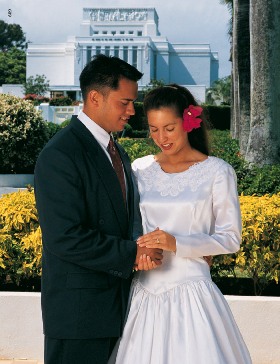Mormons (members of The Church of Jesus Christ of Latter-day Saints) hope to be worthy to marry the “right person, at the right time, in the right place” (late Mormon prophet Spencer W. Kimball). That means marrying a person of whom the Lord approves, when both bride and groom are well-prepared, in a Mormon temple where eternal covenants can be made. Couples throughout history in various places of the world have married for various reasons. Sometimes marriages were arranged, and partners had little hope of being soul-mates; some marriages were essentially business arrangements, and husbands expected to dally with other women to find emotional happiness. Nowadays in America, a single person searches for a soul-mate with whom he or she may be compatible in all aspects of married life. American couples tend to divorce when that simpatico element wears off or a partner disappoints in some way. Cohabitation and “starter marriages” are meant to qualify partners to make sure they are perfect.
“You come to love not by finding the perfect person, but by learning to see an imperfect person perfectly.” – Sam Keen
 The Mormon view of marriage is quite different. God is interested not only in our salvation, but in our exaltation, which means joining Him in the very highest kingdom of heaven where He dwells, a place of utmost glory and goodness. The highest of the highest kingdom of heaven is reserved for those who have entered into the eternal marriage covenant and kept those covenants, enduring to the end with faith in Christ. These expect to dwell with their families forever. Mormons who are considering marriage are privy to personal revelation to validate their choice. This important decision, especially, concerns Heavenly Father, and He is ever ready to help.
The Mormon view of marriage is quite different. God is interested not only in our salvation, but in our exaltation, which means joining Him in the very highest kingdom of heaven where He dwells, a place of utmost glory and goodness. The highest of the highest kingdom of heaven is reserved for those who have entered into the eternal marriage covenant and kept those covenants, enduring to the end with faith in Christ. These expect to dwell with their families forever. Mormons who are considering marriage are privy to personal revelation to validate their choice. This important decision, especially, concerns Heavenly Father, and He is ever ready to help.
A celestial marriage is made up of two imperfect people committed to trying to live the commandments of God, especially the two main commandments — to love God with all their heart, mind, might, and strength; and to love their neighbors as themselves. That means having charity for one’s spouse. Charity is the pure love of Christ. It is a gift from Him. A person who has charity forgives. Loving one’s spouse and living for many years together in mortality is not easy, but it helps to make us like Christ. Charitable couples may carry romance into advanced old age. In the afterlife, the weaknesses of mortality fall away.
“It is a curious thought, but it is only when you see people looking ridiculous that you realize just how much you love them.” – Agatha Christie
My husband and I have been married for 45 years. We have looked ridiculous myriads of times. Luckily, our memory is failing us, and we can’t remember any of it. Seriously, if we can continue to unselfishly love, we will see and act with clarity once mortality is ended. Many of our foibles are the result of genetic conditions and erroneous information. Both physical limitations and bad information will fall away after we leave this earth.
In spite of our orientation to keeping the rules God sets for us, we are expected by Him to have a sense of humor, too. A lot of our behaviors and misunderstandings have been pretty funny.
“Love is what you’ve been through with somebody.” – James Thurber
 If this is true, my husband and I are really in love. We’ve done it all — business failures, 24 moves (some to foreign cultures), six kids, thirteen grandkids, and all the adventures that come with having a large family. Flat tires, bad landings, the inability to say just what we mean, illness, challenges with extended family, helping aged parents. We’ve been through a lot, and here we are, still striving to be good and figure out what’s best.
If this is true, my husband and I are really in love. We’ve done it all — business failures, 24 moves (some to foreign cultures), six kids, thirteen grandkids, and all the adventures that come with having a large family. Flat tires, bad landings, the inability to say just what we mean, illness, challenges with extended family, helping aged parents. We’ve been through a lot, and here we are, still striving to be good and figure out what’s best.
That’s love—the kind that can last forever.
Gale is a former fibro and CMP sufferer. She hopes this information will help other sufferers on their journey to good health.



